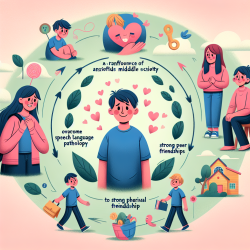Understanding Anxious Solitude in Children
The recent study titled "Anxious Solitude, Reciprocated Friendships with Peers, and Maternal Overcontrol from Third through Seventh Grade: A Transactional Model" offers valuable insights into the development of anxious solitude in children. This research provides a comprehensive look at how peer relationships and maternal behaviors influence children's social anxiety over time. For practitioners working with children, understanding these dynamics is crucial for developing effective interventions.
The Transactional Model: A New Perspective
The study employs a Transactional Model to explore how interpersonal stressors, such as losing friendships and maternal overcontrol, contribute to the growth of anxious solitude in children. The model also examines how increased anxious solitude exacerbates these stressors, creating a cyclical pattern that can be challenging to break.
Key Findings and Implications
- Peer-Driven Chronic Stress: The study found that having few mutual friendships can lead to an increase in anxious solitude during middle childhood. This suggests that children with fewer friends may feel more vulnerable and anxious in social situations.
- Youth Stress Generation: Anxious solitude in children can lead to a decrease in the number of friendships over time. This indicates that social anxiety can make it difficult for children to maintain existing friendships or form new ones.
- Maternal Overcontrol: Anxious solitude in children was found to evoke increased maternal overcontrol. This overcontrol, while well-intentioned, can further limit children's social interactions, exacerbating their social anxiety.
Practical Applications for Practitioners
For practitioners, these findings highlight the importance of addressing both peer relationships and parental behaviors when working with children experiencing anxious solitude. Interventions could include:
- Encouraging the development of peer friendships through structured social activities.
- Working with parents to reduce overcontrolling behaviors and promote autonomy in their children.
- Providing children with strategies to manage social anxiety and improve social skills.
Encouraging Further Research
This study opens the door for further research into the interplay between peer relationships, parental influence, and anxious solitude. Future studies could explore interventions that target these areas and evaluate their effectiveness in reducing social anxiety in children.
To read the original research paper, please follow this link: Anxious Solitude, Reciprocated Friendships with Peers, and Maternal Overcontrol from Third through Seventh Grade: A Transactional Model.










